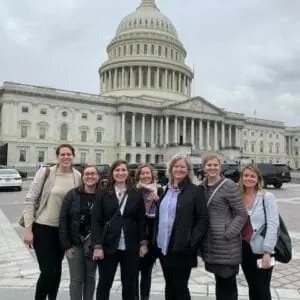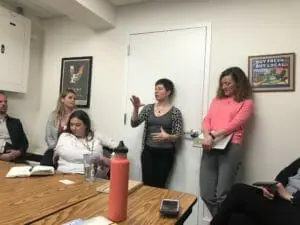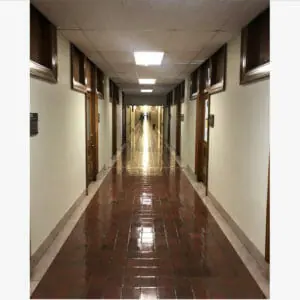This blog post was written by Arizona State University graduate student Liz Broussard. In addition to studying Food Policy and Sustainability Leadership at ASU, Liz serves as a project coordinator at the National Center for Appropriate Technology (NCAT), where she supports the Mississippi Food Justice Collaborative, a network of organizations working to improve access to healthy food and transform Mississippi food systems.
During our Food Policy Immersion in DC, my classmates and I had the opportunity to visit “the Hill,” speak to legislators, learn about the inner-workings of different agencies at the United States Department of Agriculture (USDA), and get a better understanding of the overall ecosystem of lawmakers, researchers, lobbyists, advocates, constituents and more, who shape policies that affect us all. To be honest, the trip was a little bit out of my comfort zone. As someone who wears jeans and t-shirts to work most days, I had to scramble to find business casual attire before the trip, including buying my first-ever blazer. As we met with different individuals in difficult-to-find rooms at opposite ends of very long and dizzying hallways, my mind worked to translate everyone’s words and experiences into meaningful and helpful messages that I could take back to my community. “THIS is what turns people away from policy work,” I thought to myself.
One of the stops along our journey that felt a little more familiar to me was the National Sustainable Agriculture Coalition office. The National Sustainable Agriculture Coalition (NSAC) is an alliance of grassroots organizations that advocates for federal policy reform on sustainable agriculture-related issues. NSAC has a small staff with some big responsibilities to help make sure that grassroots voices are heard and represented in federal policymaking related to food and farm issues.
At the time of our visit, NSAC was in the process of hiring for a Grassroots Director and also grappling with the challenges of how to grow as an organization and provide more equitable pay and support to their staff while feeling stretched by the rising costs of living and working in DC. Their staff work hard to support and empower their team of 130+ member groups across the country who are all united in their values and commitment to promoting a healthier, more vibrant food and farming system.
On the same day we visited the NSAC office, we learned that the first COVID-19 case had hit Capitol Hill, so staff were busy gathering the latest information in order to connect with their member organizations, anticipate COVID-19’s impact on farmers and the food system, and to work on the coalition’s response, including policy and action recommendations. (If you’re curious, you can find a list of resources that NSAC has compiled here!) The COVID-19 pandemic highlights existing inequities in our food system and how it is more important than ever to support the wellbeing of farmers and build resilience within our food and farm systems. NSAC is working to do its part in bringing grassroots perspectives to conversations in DC that are normally dominated by big business.
Their network approach was a powerful reminder of the work that we all must do across the country to motivate, organize, and educate our communities on a local level. By the time we left the NSAC office, I was feeling ready to get home and get back to work in my own community. Being on the Hill was a really valuable experience to get to know more about the people and processes who are making the policy decisions in DC, as well as organizations like NSAC who are working hard to be connectors, translators, and bridge-builders with local communities. And now I’m grateful to be back home in Mississippi with renewed energy to work alongside my community as we shift power to transform our food system from the ground up. I still prefer working in jeans and t-shirts, but I’ll keep this new blazer in my closet, just in case.
On behalf of the entire ASU Food Policy and Sustainability Cohort, I would like to extend our sincere appreciation to the National Sustainable Agriculture Coalition for giving us the opportunity to visit and learn more about their work promoting sustainable agriculture in the US.
As we navigate these uncertain times it is more important than ever to have a robust network of food and agriculture policy leaders to make sensible and responsible decisions. Could you be one of those people? Learn more about answering this call by checking out the Food Policy and Sustainability Leadership Program at ASU!


